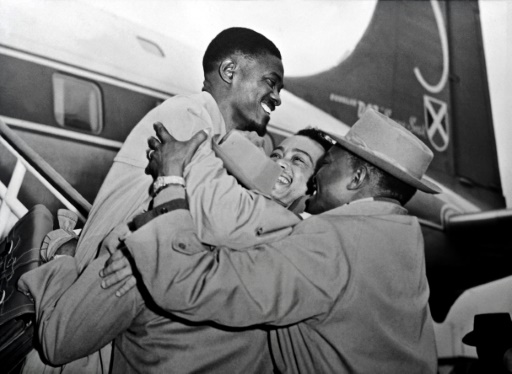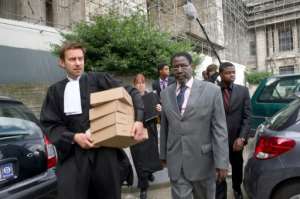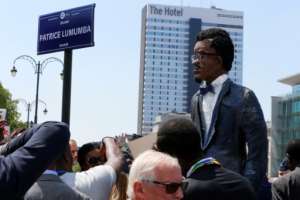
[ad_1]
Will justice ever be done for Patrice Lumumba?
Aged just 35, the charismatic hero of independence from the Belgian Congo was assassinated 60 years ago in a plot linked to the colonial master of the nascent nation.
He was shot dead by firing squad by Katangese separatists and Belgian mercenaries on January 17, 1961 in southeastern Congo during the chaotic first months of independence.
His body, dissolved in acid, has never been found, except for a tooth.
The nationalist leader was seen as a postcolonial fire killer with communist sympathies and a threat to Belgian interests, especially in the copper-rich province of Katanga.
According to diplomatic messages between Brussels and its former colony, Lumumba, first Prime Minister of the fledgling republic, was the “devil” and a man to be “eliminated” with a clearly marked target on his back.
 Lawyer Christophe Marchand, on the left, and François Lumumba, the son of Patrice Lumumba (photo / Belga). By FILIP CLAUS (BELGA / AFP / File)
Lawyer Christophe Marchand, on the left, and François Lumumba, the son of Patrice Lumumba (photo / Belga). By FILIP CLAUS (BELGA / AFP / File) Sixty years later, an investigation in Belgium for “war crimes” is in its final phase, according to lawyer Christophe Marchand, who filed a complaint in 2011 on behalf of François Lumumba, son of the murdered leader.
“We are heading for a hearing this year before the council chamber of the Brussels court to see whether or not the case can lead to a jury trial,” Marchand told AFP.
‘Vast conspiracy’
For the lawyer, time is running out.
Only two of the 10 people initially targeted by the complaint are still alive.
They are a former Belgian diplomat and former vice-president of the European Commission, Etienne Davignon, 88, and a former senior official, Jacques Brassinne de la Buissière, 91, according to sources familiar with the matter.
The complaint, consulted by AFP, accuses “different administrations of the Belgian state” of having “participated in a vast conspiracy for the political and physical elimination of Patrice Lumumba”.
He recalls that the Belgian army had kept some 200 soldiers to support the security forces of the secessionist province of Katanga, where the crime took place.
For now, the only comfort for Lumumba’s bereaved family is her tooth.
It was seized from a Belgian policeman who, on his own, took it by helping dispose of the body.
Democratic Republic of Congo President Félix Tshisekedi last month said Belgium would give back his family in time for the independence anniversary celebrations on June 30.
“It is an important symbol for the family and all the Congolese people,” the head of the Belgian federal prosecution, Frédéric Van Leeuw, told AFP.
The restitution should take place in the coming weeks or months during an official ceremony in Brussels in the presence of the children of the deceased, said the prosecutor.
Juliana Lumumba, daughter of the murdered icon, called for the return of the tooth in a letter to King Philippe of Belgium last year, amid the Black Lives Matter protests.
‘Tons of archives’
For Van Leeuw, formal accusations are only possible if “you have proof that someone in a chain of command knew what was going to happen and really wanted what happened”.
The search was “particularly difficult” for the few investigators who were confronted with “tons of records,” Van Leeuw said.
 People stand next to a giant effigy of Patrice Lumumba during ceremonies in Brussels in 2018 to inaugurate a square in honor of the murdered independence hero (photo / Belga). By NICOLAS MAETERLINCK (BELGA / AFP / File)
People stand next to a giant effigy of Patrice Lumumba during ceremonies in Brussels in 2018 to inaugurate a square in honor of the murdered independence hero (photo / Belga). By NICOLAS MAETERLINCK (BELGA / AFP / File) He noted that by qualifying the assassination as a “war crime” in 2012, “the Brussels Court of Appeal went beyond the commission of inquiry” of the Belgian parliament which had concluded in 2001 that Belgium was “morally responsible”.
A year after this legally vague admission, the Belgian government has offered the country’s apologies.
Since then, official mention of Lumumba in Belgium has been rare, with ghosts from the colonial past still present.
For the anti-racist association Bamko, Lumumba is a major figure who deserves more than the small town square which was inaugurated in 2018 on the outskirts of Matonge, the heart of the African diaspora in Brussels.
“People like him allow us to stand up and be worthy,” said Mireille-Tsheusi Robert, president of Bamko.
“To do him justice is also to do justice to all Afro-descendants of the Congo”, he declared.
Source link